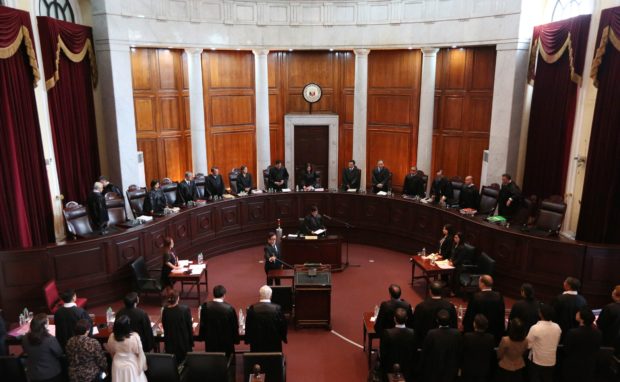DND, AFP execs brief SC on rebellion

MARTIAL LAW ORALS. INQUIRER/ MARIANNE BERMUDEZ
The Supreme Court on Thursday wrapped up three days of oral arguments after a closed-door briefing by top defense and military officials on the security situation in Marawi City and the rest of Mindanao and prepared to rule within the 30-day limit prescribed in the Constitution on the legality of President Duterte’s martial law declaration in the region.
Briefing reporters at the conclusion of hearings on three petitions questioning the constitutionality of Mr. Duterte’s proclamation on May 23, following the siege of Marawi by Islamic State-allied terrorists, spokesperson Theodore Te said the magistrates directed the parties to submit their respective memorandums by June 19.
Te said that after the presentation by Defense Secretary Delfin Lorenzana and Gen. Eduardo Año, the chief of staff of the Armed Forces of the Philippines, the justices continued their questioning of the lawyers for the petitioners and the government.
Lorenzana, the designated martial law administrator, and Año faced the magistrates and the lawyers for the petitioners in a seven-hour “internal discussion” at the request of Solicitor General Jose Calida, according to Te.
In the previous hearings, the magistrates had complained that the petitioners had not provided information with which to base a decision on the sufficiency of the factual basis for the declaration. Some justices averred that other areas in Mindanao remained peaceful.
Te said Rule 119, Section 21 of the Rules of Court allowed the tribunal to “exclude the public when the information that will be disclosed may be prejudicial or detrimental.”
As ordered by the magistrates, he said only Albay Rep. Edcel Lagman was allowed to represent the petitioners in hearing the presentation and the interpellation of the military officials.
“After satisfying itself of the information presented by the respondents, [the court] has directed the parties to submit their memorandum simultaneously [on June 19],” Te told a press briefing.
Military actions
Speaking with reporters, Calida said Año and Lorenzana presented intelligence information and other operational details of the military actions in connection with the Marawi siege to support the factual bases of Mr. Duterte’s martial law proclamation.
“Because of the sensitivity of the answers that were given, the Supreme Court, in its discretion, limited the members and persons who can hear the testimonies,” Calida said.
The state’s top lawyer said he was optimistic that the high court would uphold the legality of Mr. Duterte’s order, which, according to him, was intended to preserve the country’s democracy.
“If you ask me, I am confident. The government is confident,” Calida said.
A military intelligence official showed a Powerpoint presentation of the operations of government forces proving that there was actual rebellion in Marawi that justified the President’s action, he said.
Documents
According to Calida, the documents furnished the justices were different from the annexes that the Office of the Solicitor General attached to its consolidated comment on the three separate petitions.
As directed by the Constitution, Te said the high court should resolve the case within 30 days from the filing of the petition, or not later than July 5.
On Thursday, Chief Presidential Legal Counsel Salvador Panelo said the concern voiced by Supreme Court Justice Mariano del Castillo that Mr. Duterte might be “emboldened” to put the entire country under martial rule was “misplaced” because the 1987 Constitution provided safeguards.
“Maybe, the apprehension is based on the abuses committed by the previous martial law declared by the late President [Ferdinand] Marcos,” Panelo told reporters.
“That has been solved by the safeguards imposed by the Constitution to allay fears of any abuse,” he added.
Panelo said these safeguards included limiting martial law to 60 days and the provision that Congress could revoke it.
He said martial law could only be declared in other parts of the country if the situation in these areas required it.
“My take on this is that it is not a question of whether or not the declaration of martial law would embolden the President or any President for that matter. The question is whether or not the facts obtaining constitutionally required the declaration of martial law,” Panelo said.
Nationwide martial law
“So, we do not know that yet. As of now, according to the President, the facts obtaining in Mindanao suffice that martial law has to be declared there,” he said.
Panelo also defended the President’s decision to declare martial law for the whole in Mindanao and not just in Marawi, where government troops are fighting Maute terrorists trying to take over the city.
He said the Maute group had a presence in other areas of Mindanao and their rebellion needed to be suppressed.
“As I said, they are well-placed all over. These are not ordinary rebel groups, given the fact that they are still there fighting and it seems that their ammunition is unlimited,” he said. —WITH A REPORT FROM PHILIP C. TUBEZA